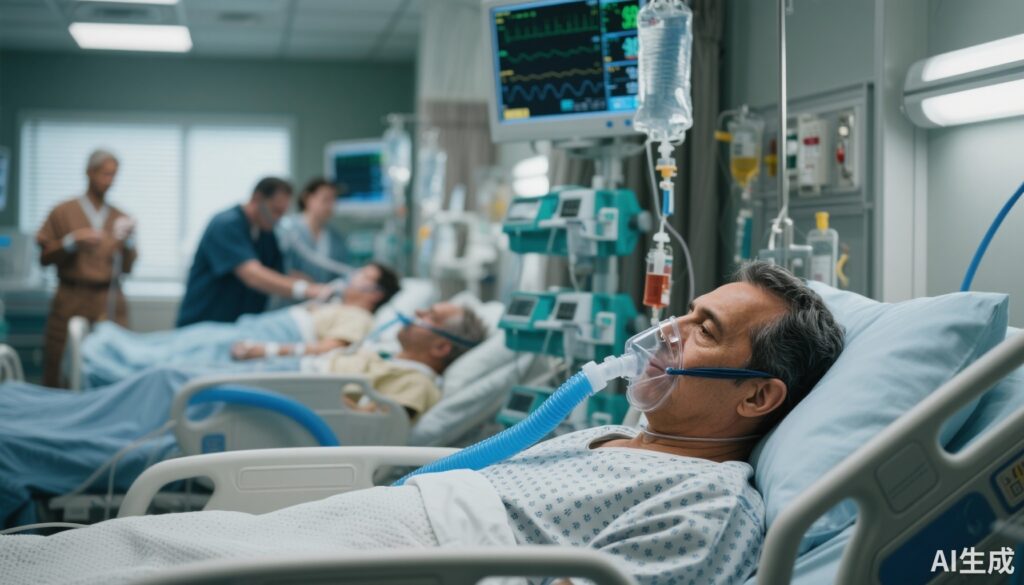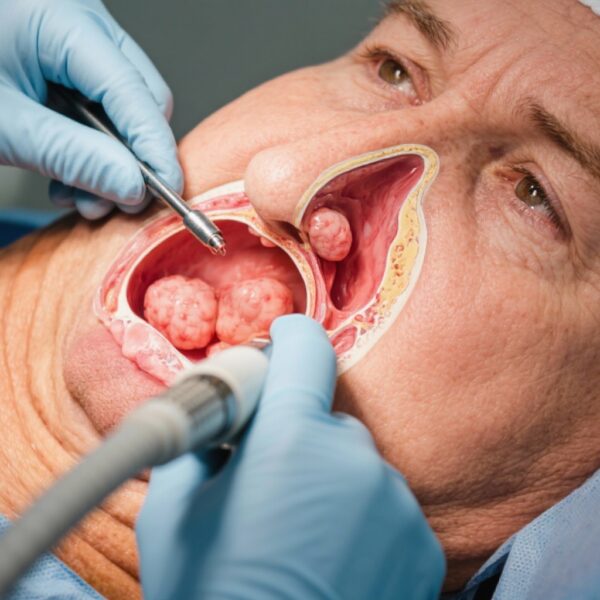Highlight
- This large multicentre, double-blind randomised controlled trial assessed adjunctive corticosteroid therapy in HIV-negative immunocompromised patients with severe Pneumocystis jirovecii pneumonia (PJP) causing acute respiratory failure.
- Adjunctive corticosteroid treatment showed a 10.9% absolute reduction in 28-day mortality (32.4% vs 21.5%) compared to placebo, but this difference was not statistically significant (p=0.069).
- No significant differences were observed in secondary infections or insulin requirement, suggesting corticosteroid safety in this population.
- These findings contrast with established benefits of corticosteroids in HIV-positive PJP, highlighting a need for further research in specific HIV-negative subgroups.
Study Background and Disease Burden
Pneumocystis jirovecii pneumonia is a life-threatening opportunistic infection predominantly affecting immunocompromised hosts. While adjunctive corticosteroid therapy is standard of care in HIV-positive patients with moderate to severe PJP due to improved survival outcomes, evidence remains limited and controversial for HIV-negative immunocompromised individuals. In this population, hospital mortality rates from PJP are notably high, ranging between 30-50%, reflecting significant morbidity and clinical challenges. Differing immune dysregulation and inflammatory responses compared to HIV-positive patients might underlie variable effects of corticosteroids. This study aimed to rigorously investigate whether early adjunctive corticosteroids improve survival in HIV-negative patients with severe PJP responsible for acute hypoxaemic respiratory failure, addressing a critical unmet need in critical care and infectious diseases.
Study Design
The trial was a multicentre, double-blind, placebo-controlled randomised study conducted across 27 hospitals in France between February 2017 and February 2024. Eligible participants were adults (≥18 years) with microbiologically confirmed Pneumocystis jirovecii pneumonia and acute respiratory failure characterized by mild-to-severe hypoxaemia. Patients had initiated anti-Pneumocystis therapy within the prior seven days. The intervention group received intravenous methylprednisolone administered at 30 mg twice daily for 5 days, then 30 mg once daily from days 6 to 10, followed by 20 mg once daily until day 21. The placebo group received intravenous isotonic saline injections. Randomisation was 1:1 via a web-based system using permuted blocks with stratification by centre, prior long-term corticosteroid use, underlying disease (malignancy vs others), and oxygen requirements (<6 vs ≥6 L/min). The primary endpoint was all-cause 28-day mortality, analyzed on an intention-to-treat basis.
Key Findings
Out of 466 patients screened, 226 met inclusion criteria and were randomised (114 placebo, 112 corticosteroids), with 218 included in the ITT analysis. The median patient age was 67 years, with a majority receiving intensive or intermediate care at baseline. Corticosteroid therapy was initiated a median of 3 days after PJP diagnosis, with a median treatment duration of 13 days.
The 28-day all-cause mortality was 32.4% in the placebo group versus 21.5% in the corticosteroid group, yielding a 10.9% absolute mortality difference, which approached but did not reach statistical significance (95% CI -0.9 to 22.5; p=0.069). Secondary safety outcomes, including the incidence of secondary infections and insulin requirements, showed no significant differences: 34.2% versus 23.4% for infections and 22.5% versus 30.8% for insulin needs in placebo vs corticosteroids, respectively.
This trial established a trend toward mortality benefit from corticosteroids in this high-risk population but failed to conclusively demonstrate efficacy at the 5% significance level. The safety profile was reassuring, with no excess of secondary infections or glycemic complications.
Expert Commentary
These findings contrast with robust evidence supporting adjunctive corticosteroids in HIV-positive PJP, where steroids reduce mortality by mitigating the intense inflammatory lung injury after antimicrobial therapy initiation. The lack of significant mortality reduction here may reflect differences in immune dysregulation or the heterogeneity of underlying immunosuppressive conditions in HIV-negative patients. Moreover, the modest sample size and borderline p-value suggest a possible type II error or underpowering, warranting further evaluation with larger cohorts or specific subgroup analyses, such as stratification by immune status or severity.
Current clinical guidelines recommend corticosteroids in HIV-positive PJP but do not strongly endorse them in non-HIV patients due to uncertain benefit and infection risk concerns. This trial’s findings provide the most robust evidence to date, suggesting corticosteroids can be safely administered but highlighting ambiguity in routine use for HIV-negative PJP. Mechanistically, corticosteroid effects on inflammation and viral or fungal clearance may vary by host immune context, necessitating personalized approaches.
It is essential to consider limitations such as potential heterogeneity in immunosuppressive therapies, timing of steroid initiation, and variations in supportive care across centers. Ongoing studies and pooled analyses may clarify which patient subsets derive the most advantage.
Conclusion
This large, double-blind randomised controlled trial demonstrated that adjunctive corticosteroids did not significantly reduce 28-day mortality in HIV-negative immunocompromised patients with severe Pneumocystis jirovecii pneumonia, despite a notable absolute risk reduction trend. Safety outcomes were comparable between groups, alleviating concerns about corticosteroid-related harms in this setting. These results challenge extrapolation of benefits observed in HIV-positive populations and highlight the need for refined patient selection, further mechanistic research, and possibly adjunctive immunomodulatory strategies in managing severe PJP in the HIV-negative immunocompromised cohort.
Clinicians should carefully weigh risks and benefits when considering corticosteroids for HIV-negative PJP, pending further evidence. Future research directions include biomarker-guided therapies and optimizing corticosteroid dosing and timing.
References
1. Lemiale V, Resche-Rigon M, Zerbib Y, et al. Adjunctive corticosteroids in non-AIDS patients with severe Pneumocystis jirovecii pneumonia (PIC): a multicentre, double-blind, randomised controlled trial. Lancet Respir Med. 2025;13(9):800-808. doi:10.1016/S2213-2600(25)00125-0.
2. Morris A, Lundgren JD, Masur H, et al. Current epidemiology of Pneumocystis pneumonia. Emerg Infect Dis. 2004;10(10):1713-1720.
3. Kaplan JE, Hanson D, Dworkin MS, et al. Epidemiology of Pneumocystis pneumonia among HIV-infected persons in the United States: Surveillance from 1986 through 1993. J Infect Dis. 1996;174(4):960-966.
4. Hughes WT, Price RA. Pentamidine isethionate therapy for Pneumocystis carinii infection in pediatric cancer patients and patients with leukemia or lymphoma. Am J Med. 1984;77(3):309-316.
5. Green H, Paul M, Vidal L, Leibovici L. Oral versus intravenous trimethoprim-sulfamethoxazole for treatment of mild to moderate Pneumocystis jirovecii pneumonia. Cochrane Database Syst Rev. 2007;(4):CD005562.
6. Hoffmann C, Mylonakis E, Aberg JA. Adjunctive corticosteroid therapy for Pneumocystis jirovecii pneumonia in HIV-negative patients: a systematic review and meta-analysis. Clin Infect Dis. 2013;57(1):104-112.
7. Good RA, Swenson RB, Pattison BA, et al. Prophylaxis and therapy of Pneumocystis carinii pneumonia in patients with cancer: A randomized trial. N Engl J Med. 1991;325(18):1215-1217.



